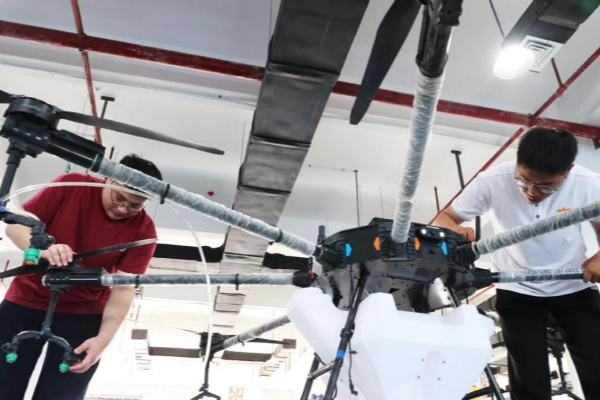
- Home
- Media Center
-
Events
- Wuzhen Summit
- Regional Forums
- Practice Cases of Jointly Building a Community with a Shared Future in Cyberspace
- World Internet Conference Awards for Pioneering Science and Technology
- The Light of Internet Expo
- Straight to Wuzhen Competition
- Global Youth Leadership Program
- WIC Distinguished Contribution Award
- Membership
- Research & Cooperation
- Digital Academy
-
Reports
- Collection of cases on Jointly Building a Community with a Shared Future in Cyberspace
- Collection of Shortlisted Achievements of World Internet Conference Awards for Pioneering Science and Technology
- Reports on Artificial Intelligence
- Reports on Cross — Border Ecommerce
- Reports on Data
- Outcomes of Think Tank Cooperation Program
- Series on Sovereignty in Cyberspace Theory and Practice
- Other Achievements
- About WIC
- 中文 | EN

China ramps up support for cutting-edge SMEs in tech advancement drive

Employees assemble a drone at an industrial park for small and medium-sized enterprises in Lianyungang, Jiangsu province, in July. [Photo for China Daily]
BEIJING - China is set to intensify its efforts to nurture and support innovative small and medium-sized enterprises (SMEs) in order to accelerate technological advancements and drive new product development.
SMEs play a crucial role in driving innovation in China. The latest efforts focus on a select group that uses specialized and sophisticated technologies to create novel and unique products.
According to the Ministry of Industry and Information Technology (MIIT), there will be an accelerated push for SMEs to migrate to cloud, adopt digital tools and leverage intelligent technologies. The aim is to foster distinctive industrial clusters of SMEs and build a high-quality, efficient service system to support them.
The MIIT previously announced that a special campaign will be launched to empower SMEs through digital transformation, with the goal of achieving full digitalization of "little giant" enterprises by 2027, the novel elites among China's SMEs that are engaged in manufacturing, specialize in a niche market and boast cutting-edge technologies.
The latest support for innovative SMEs aligns with a recently unveiled key policy document that underscores the importance of reinforcing the primary role of enterprises in innovation.
By the end of June this year, China had cultivated over 140,000 such SMEs, including 12,000 "little giant" enterprises.
To encourage scientific and technological SMEs to increase their research and development (R&D) spending, China will raise the rate of additional tax deductions for their R&D expenses, according to the policy document.
Furthermore, efforts will be made to encourage and guide higher education institutions and research institutes to authorize the use of their proprietary scientific and technological advances by micro, small, and medium enterprises on a "use first, pay later" basis.
In terms of the service system, China has established more than 1,780 public service institutions for SMEs at the national, provincial, municipal, and county levels, according to the latest MIIT data. The coverage rate of institutions at the municipal-level and above has hit 84 percent.
This figure marks new progress in the ministry's plan to bolster support capabilities across all levels by 2025 for SMEs. By 2035, the goal is to establish a sophisticated service system that aligns with the high-quality development of SMEs. This system will focus on creating a framework of top-tier institutions, strong platforms, rich resources, excellent services, and high satisfaction rates.
China's SME promotion law stipulates that people's governments at or above the county level should establish and improve public service institutions based on actual needs. These institutions provide public welfare services to SMEs, including intellectual property protection, investment and financing, technical support, and talent acquisition.

The World Internet Conference (WIC) was established as an international organization on July 12, 2022, headquartered in Beijing, China. It was jointly initiated by Global System for Mobile Communication Association (GSMA), National Computer Network Emergency Response Technical Team/Coordination Center of China (CNCERT), China Internet Network Information Center (CNNIC), Alibaba Group, Tencent, and Zhijiang Lab.





